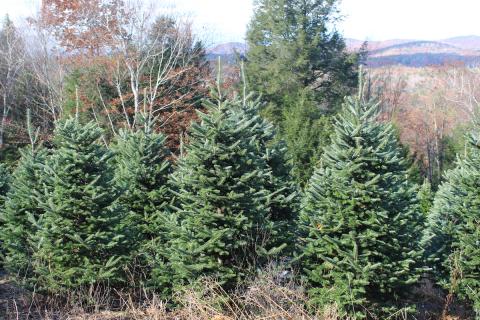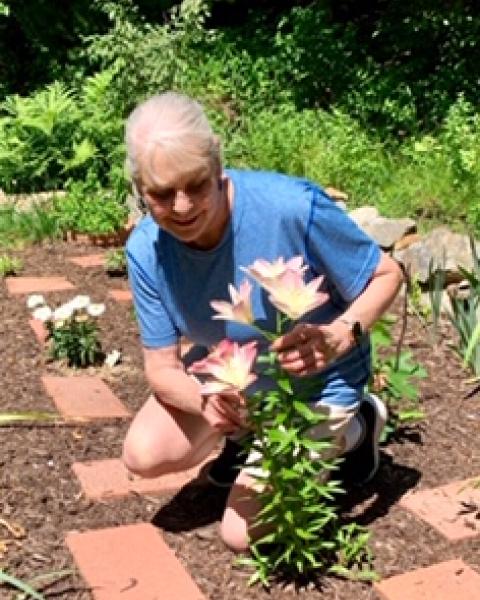Selecting a Christmas Tree

My family used to go out and buy a Christmas tree every December. It was their thing to do. I stayed home. One year after the holidays, I bought a beautiful artificial tree thinking they’d be happy to cease the wintery trek. The family mutinied, and I heard about it for weeks. When I recounted this to Ethan Belair, a natural resources field specialist and forester for UNH Cooperative Extension in Hillsborough County, he laughed and said, “Go real or go home!”
If Belair was going to buy a tree, the first thing he would do is look for freshness. “Some of these trees may have been cut a month before and shipped in,” he said, but at another lot a tree seller might “have gotten their trees from one town away.” There are good reasons for getting a local tree, “They are fresher, not from out-of-state, and you support a local industry.” When Wendy Scribner’s daughter was young, she used to go to a tree farm and cut a tree. Now the Carroll County forester for UNH Cooperative Extension, buys a local balsam, her choice for Christmas trees. Scribner said most of the trees in New Hampshire are fir trees, and balsams are the most fragrant. “You want to be able to smell that fir fragrance for a while,” she said. When shopping in a tree lot, she recommends squeezing the needles on a branch, and if they seem brittle or snap, it’s a sign the tree has been on the lot for some time. She also suggests picking the tree up by the stem and “gently banging it on the ground.” If a lot of needles fall off, that means the tree’s been cut for a while.
Belair said he looks for freshness in the needles’ color, which “should be a bright green, not ashy gray.” If gray, it’s a clue the tree has nearly dried out. “There should be a lot of flex to the needles,” he said. Just like Scribner, he recommends testing the tree’s freshness by grabbing a branch and running your fingers along its length. “If the needles fall off, go to another tree.” He also said when looking at a possible tree candidate, “turn it 360 degrees to check that the branches are equally distributed, and make sure the stem is as straight as possible.”
When you have selected the perfect tree, Scribner advises asking the tree seller to cut an inch or two from the tree’s lower stem. “They usually have a saw and can do that for you.” And if you left the lot without having the trunk cut, said Belair, “make sure to trim the tree’s bottom once you get home to expose a fresh layer.”
Belair and Scribner agree the tree’s base should be cut with a chain saw or manual saw, not a reciprocal or fast-moving saw that will cause the sap to seal the cut making water absorption impossible. The tree should be watered immediately after getting it home, and expect in the first few days the tree will drink a lot of water. Watering should be continued throughout it’s time indoors. A well-watered tree will lose fewer needles.
“There’s a tendency to promptly decorate a tree,” Belair said, “but hold off a few hours. Let the tree relax in the warmth of the house, then the branches will lower and be ready to trim.”
Scribner urges tree buyers to keep the tree away heat sources, and if you are tempted to use a commercial supplement to prevent needle drop, forget it. “Those aren’t really helpful and don’t have much impact, if any,” she said.
Although Scribner’s daughter is away at college now, she still enjoys putting up a Christmas tree. “I do it for me!”
UNH Cooperative Extension Master Gardener volunteers share information about home, yard, and garden topics with the people of New Hampshire. Got questions? Master Gardeners provide practical help finding answers to your questions through the Ask UNH Extension Infoline. Call toll free at 1-877-398-4769, Monday to Friday, 9 a.m. to 2 p.m., or e-mail us at answers@unh.edu.
Do you love learning about stuff like this?
SUBSCRIBE TO Granite State Gardening newsletter
Got questions? The UNH Extension Yard and Garden Infoline offers practical help finding answers for your yard and garden questions.
Call toll free at 1-877-398-4769, Monday to Friday, 9 a.m. to 2 p.m., or fill out webform.

